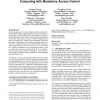45 search results - page 4 / 9 » Transparent Runtime Randomization for Security |
145
click to vote
VEE
2006
ACM
15 years 8 months ago
2006
ACM
One of the most common forms of security attacks involves exploiting a vulnerability to inject malicious code into an executing application and then cause the injected code to be ...
106
Voted
SIGGRAPH
2009
ACM
15 years 8 months ago
2009
ACM
We present a novel bounding volume hierarchy (BVH) compression and decompression method transparently supporting random access on the compressed BVHs. To support random access on ...
118
Voted
SOSP
2009
ACM
15 years 11 months ago
2009
ACM
Fabric is a new system and language for building secure distributed information systems. It is a decentralized system that allows heterogeneous network nodes to securely share bot...
116
click to vote
CCS
2007
ACM
15 years 8 months ago
2007
ACM
The increasing number of software-based attacks has attracted substantial efforts to prevent applications from malicious interference. For example, Trusted Computing (TC) technolo...
107
click to vote
CCS
2004
ACM
15 years 7 months ago
2004
ACM
Address-space randomization is a technique used to fortify systems against bu
er over
ow attacks. The idea is to introduce arti
cial diversity by randomizing the memory location o...

